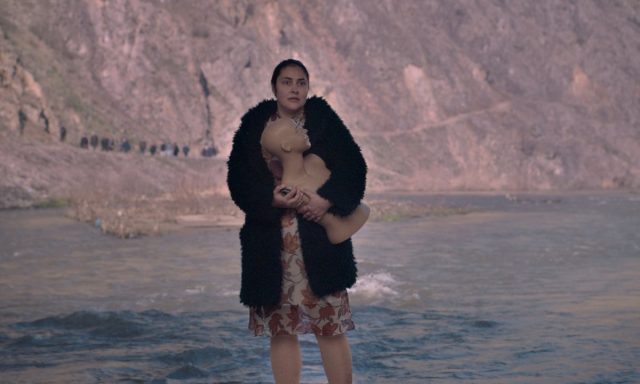God Exists, Her Name Is Petrunya: Nobody Special, by David Bax

God Exists, Her Name Is Petrunya, the arrestingly titled new feature from Macedonian director Teona Strugar Mitevska, opens with a handful of shots that seem to exist out of sequence from the compact narrative timeline of the rest of the movie. In the first of these, Petrunya (Zorica Nusheva) stands stock still at the bottom of an empty, Olympic size swimming pool, staring at the camera while punk rock music plays. It’s a stirring introduction as well as a fitting soundtrack for both a brave, independent character and a bold, provocative film.
After much prodding from her mother (Violeta Sapovska), Petrunya sets out to interview for a job as a secretary. It goes terribly and, on the way back home, she encounters a boisterous religious ceremony on a riverbank. Overcome by, well, something, she jumps in (literally), immediately becoming the focus of a local scandal because, as it turns out, women do not participate in this tradition. Over the course of the day and following night, Petrunya stands her ground (as exemplified by the generally locked down camera) while clergy, family, police, reporters and religious zealots dial up the chaos around her (reflected in the occasional intrusions of handheld news footage).
After the introduction mentioned before, the other out-of-context shots detail a processions of priests and/or monks, chanting and carrying crosses and other Christian totems through the Macedonian countryside. Then we cut to Petrunya being awoken by her mother. Perhaps it was her dream we were watching, since–even before getting involved in the riverside custom–she starts to display an apparently uncharacteristic Christian point of view. The question of what exactly Petrunya believes in and to what extent gives extra color and dimension to everything that follows.
We know very little about Petrunya, at least at first. Details about her history are revealed in her interview with the potential employer and, later, in her interrogations at the police station. There are two things, though, that we know very early on. She is unemployed. And she is a virgin. Metaphorically, these are not coincidences, as God Exists draws stark connections between economic anxiety and misogyny among the population which it effects. But in the psychology of the character, too, these twin desperations feed off one another. The fervor that overtakes her at the river cannot be extricated from her career disappointment or from the fact that the ceremony’s participants are a teeming mass of shirtless young men. That she will repeatedly be called a “whore” for the rest of the day underlines both the hypocrisy of those slinging the epithet as well as the tragic paradox faced by Petrunya and women the world over.
Mitevska differentiates between religious faith and dogmatic, self-serving tribalism but recognizes that the line between them is wavy and blurred, particularly for someone like the local priest (Suad Begovski), whose most outspoken congregants tend to embody the latter type of belief. By introducing a police procedural element to God Exists, Mitevska is both making a political point (that the church has undue influence in Macedonia’s local government institutions) and drawing a comparison between unexamined religious conviction and bureaucracy, two things that fill the movie’s world with unnecessary and dangerous noise.
By agitating for a cause like women’s rights, God Exists belongs to the punk rock tradition invoked by its opening. But in doing so by first engendering sympathy for its lead and then weaponizing that sympathy against the powers that be, it belongs to a great tradition of activist cinema as well.





























